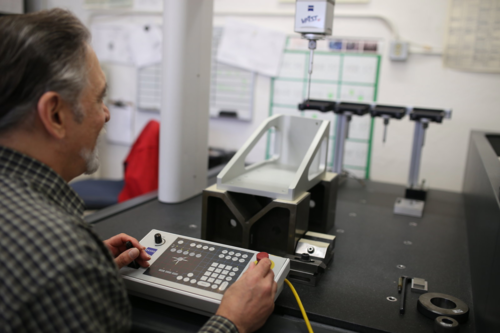Learn how Design for Assembly and Design for Manufacturing can help cut costs, reduce material and labor costs, optimize production workflows, and more.
Read MoreRoutine audits are critical to ensure quality and compliance on products or systems across a network of suppliers and partners. No matter the audit type, it is important to understand the roles within the manufacturing supply chain and to drill down on processes used, especially in the use of contract manufacturing. Every audit is different, but the broader goal is to verify and evaluate what is in place and used by your contract manufacturer. Your audit should identify the strengths and weaknesses of your contract manufacturer. Below you’ll find basic guidance for performing a contract manufacturing audit that will help you achieve quality and compliant manufacturing outcomes.
Read MoreImagine a world where your business can effectively scale its manufacturing. A world that doesn’t include heavy investment in developing your own infrastructure. Or, inconveniencing functional operations with time-driven activities such as document management. This is, in fact, a reality for businesses that outsource their manufacturing. In fact, since the early 1990s, businesses identified outsourcing as a form of business strategy with an aim to reduce costs. Businesses today still use outsourcing manufacturing to scale quickly and innovate smarter. Businesses outsource many components of manufacturing. Specifically, the areas of their business that cause unnecessary delays or encounter disorganized processes. One of these areas is outsourcing manufacturing document management. Outsourcing manufacturing document management streamlines business processes and results in cost reduction.
Read MoreAs a contract manufacturing company, we help many robotics startups who are struggling to scale their manufacturing. There is usually not one single reason why these startups fail but there are similar shared factors preventing scale and survival. Luckily, failure for robotics startups is not inevitable and is preventable. In this blog, we discuss three common reasons for robotics startups failing to scale.
Read MoreFrom toilet paper to baby formula shortages, the importance of supply chain management is deeply felt following the COVID-19 pandemic. Everyday non-specialty items simply aren’t built to handle demand fluctuations. Generally speaking, supplies like these are restocked continuously and usually handled in the most cost-effective way. Therefore, an effective and efficient supply chain management system was not on the radar for most businesses during this time. Pandemics, epidemics, and even times of war reveal how fragile supply chains are. But it shouldn’t take serious events to trigger prioritizing effective and cost reduction strategies for your supply chain management of finished goods. The manufacturing of specialty supplies for energy, medical devices, robotics, semiconductor, and aerospace industries presents an opportunity now more than ever for more resilient supply chain solutions that generate profits and increase efficiency.
Read MoreAdvanced industries like aerospace and life sciences rely on a complex supply chain of sophisticated manufacturers. As technology quickly evolves, specialized fabricators, machine shops, raw material providers and others throughout the supply need to adapt and adjust to meet consumer or commercial demand. In many cases, new advances in technology also create new challenges for electromechanical integration as devices and components become smaller, more adaptable, and increasingly regulated.
Read More“Turnkey” is a term used to describe any situation where the end customer receives a product that is fully ready to use or distribute. Manufacturing is no different, and turnkey solutions can cover every aspect of product development and production, from design to procurement and final assembly.
Read MoreIf precision machining is only one aspect of your overall manufacturing needs, you should consider partnering with a contract manufacturer for more comprehensive support. This type of turnkey approach can accelerate the path from prototype to full volume production, or eliminate the need for manufacturing capacity altogether.
Read MoreA major issue that companies face when doing business internationally is whether or not to outsource some of their manufacturing needs to a third party.
More and more businesses, including Apple, Adidas, Hewlett-Packard, and Shell, are outsourcing manufacturing to third-party companies. Moving operations overseas is an enormous undertaking, and outsourcing can remove the bulk of this burden from manufacturers. However, such a significant decision requires careful consideration of several important factors.
Read MoreFinding the right automation equipment manufacturer will help your business boost productivity and increase efficiency across operations.
Read MoreMedical device contract manufacturing provides medical device manufacturers with access to medical devices without adding significant overhead or taking up valuable resources.
Every business wants to grow, but with business growth and expansion comes a multitude of new challenges. While it may seem simpler to outsource many of these new challenges, there are some aspects that business owners are reluctant to contract out.
Read MoreAs a fundamental building block in all businesses, supply chains have been undergoing dramatic changes over the past few decades as a result of globalization and advances in technology. Effective supply chain management has increased in importance for this reason and is crucial to business success whatever the industry.
Read MoreIndustrial robots were first invented in the 1960s, and the company General Motors used the first one. According to Mike Wilson, author of Implementation of Robot Systems, there were over 2 million robots installed in different industrial sectors in 2015. This number has increased as more and more manufacturers introduce robotic systems integration into their production lines. It’s one of the latest technologies, dubbed the future of manufacturing.
Read MoreWithout question, a primary factor for any equipment manufacturer in today’s competitive market is its ability to create and maintain innovative products that align with what clients need while keeping an eye on the future of their industry.
Read MoreCountless industries are turning to contract manufacturing, including medical device companies. A medical device contract manufacturer can make the entire medical product or a component of the medical device through injection molding. This may include life sciences products, medical circuit board assembly, and items used in medical research.
Read More




![[Quick Guide] Robotics Manufacturing: From Prototype to Production](https://images.squarespace-cdn.com/content/v1/59e651fa4c0dbfb131adb6b7/1665626969342-L5ZSMR2FHM1WDX75XKM9/quick+guide.jpeg)












